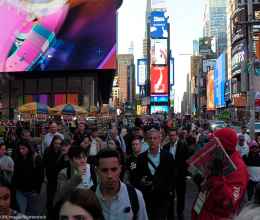
A heated controversy over audio recording in Green Bay, Wisconsin has resurfaced an important privacy issue that we have been monitoring for years: the placement of surveillance microphones in public places. When it emerged that live microphones had been installed in public hallways as part of the security system in city hall, a number of politicians objected, including a city alderperson and members of the Wisconsin State Senate, who subsequently filed a lawsuit. City officials, meanwhile, defended the mics.
Similar deployments have come to light in the district attorney’s office in Nashville, and the city clerk’s office in East Providence, Rhode Island. The deployment of surveillance microphones in this manner needs to stop.
Audio surveillance can be significantly more intrusive than video surveillance.
Audio surveillance can be significantly more intrusive than video surveillance. If you’re walking down the street talking about wild times with an old friend, the video will probably be quite boring — just two people walking down the street — but the audio could be compromising indeed.
And this kind of recording is legally problematic. Laws in all the states, as well as federal law, make it illegal to record a conversation where the recording party is not a participant — and some state laws require the permission of all participants in a conversation. This is why, even though surveillance cameras have become commonplace in American public spaces, very few of them include microphones.
Ethan Ace, an expert at the surveillance research company IPVM, told me that surveillance cameras are rarely installed with working microphones outside of special places like police interrogation rooms, and when they are, those microphones are rarely activated. In addition, the built-in mics that a minority of professional surveillance cameras include are typically inadequate for audio surveillance; where such surveillance is desired, purpose-specific microphones typically have to be installed. This is what was done in Green Bay, as well as in Nashville, where the system installer told the television station WTVF, “We don’t put audio on a camera unless they specifically ask for it.” The audio surveillance in these cities was not an afterthought.
The deployment of surveillance microphones in this manner needs to stop.
Most state wiretapping laws only forbid recording where people have a “reasonable expectation of privacy.” Police carrying out their duties in public, for example, have tried to use these laws to stop people from recording them with their phones, but the courts have shot that down. Defenders of microphones in public places have tried to argue that because people are in a public place, they have no such reasonable expectation. It’s not entirely clear what the legal lines are here as the jurisprudence is limited. Surely, though, under any commonsense definition of the phrase, two people talking political strategy in a deserted hallway at 1:00 in the morning with nobody else around should be able to “reasonably expect” that their conversation isn’t being recorded. In Green Bay, in fact, a local TV station obtained recordings from the city hall and reported that “At the end of the hallway, we could clearly hear … personal conversations between individuals discussing medical issues.”
The purpose and intent of our wiretapping laws comes from a recognition that technology makes it possible for us to be overheard through small, often invisible devices even when no other humans are around, which has the potential for enormous disruption and abuse. Does anybody want to live in a country where we have to constantly look around us wondering whether there’s a live mic picking up what we’re saying?
But context is everything, and blanket audio surveillance is legally problematic, susceptible to abuse, and something that no rational American should want to become widespread.
Under the logic of “you have no privacy in public places,” the government could string hidden microphones throughout our national parks, and if you’re hiking through the wilderness alone with a lover or a friend, it would be totally legitimate for you to be recorded. But in a place like a city hall or district attorney’s office, sites of perpetual political, legal, and personal dramas, there are certainly more urgently private conversations than in the average public space. And there would also be more incentives in those places to eavesdrop on such conversations.
There are also significant questions about the security rationale for putting mics in public places. What, exactly, are the circumstances when audio surveillance proves important in providing security? Anybody can come up with movie-plot scenarios, but how serious are those situations, how frequently do they arise, and how crucial are audio recordings when they do? If somebody starts becoming disruptive and verbally abusive, for example, anybody present is free to take out their cellphone and start recording the situation — the ACLU has defended people’s right to do just that in numerous cases from across the country. How much does a ceiling microphone, recording 24/7 including when few people are around, really help security in such a situation?
Obviously, there are plenty of spaces in a building like a city hall where it’s legitimate for recording to take place. City council meetings or other public events are often recorded and broadcast, and such chambers often contain microphones (though even there they shouldn’t be turned on unless, through context or sign, that is obvious to everyone). Reporters interview people. But context is everything, and blanket audio surveillance is legally problematic, susceptible to abuse, and something that no rational American should want to become widespread.







